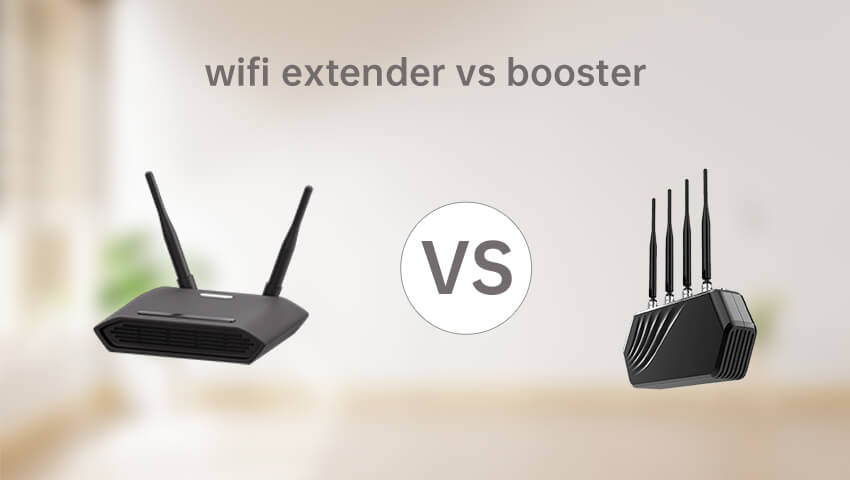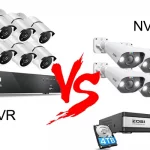In today’s connected world, a weak Wi-Fi signal can be incredibly frustrating. Whether it’s your video call freezing or your streaming buffering endlessly, poor coverage is a problem many households face.
That’s where WiFi extenders and boosters come in. You’ve probably heard both terms before, but do they mean the same thing? Not exactly. In this article, we’ll explain the difference between a WiFi extender and a WiFi booster, and help you figure out which one is the right choice for your home or office.
Contents
Understanding WiFi Coverage Problems
Before we dive into devices, it’s important to understand why your Wi-Fi signal weakens.
Several factors can affect your wireless connection:
Distance: The farther you are from your router, the weaker the signal becomes.
Obstacles: Thick walls, furniture, and metal surfaces can block or weaken the Wi-Fi signal.
Interference: Devices like microwaves, Bluetooth gadgets, and even neighboring Wi-Fi networks can cause interference.
Router limitations: Older or budget routers may not be powerful enough to cover large spaces.
If you often find yourself in “dead zones” where Wi-Fi simply doesn’t reach, you might need a secondary device to extend or enhance your network coverage — that’s where extenders and boosters come in.
What Is a WiFi Extender?
A WiFi extender (sometimes called a repeater) connects to your router and rebroadcasts the existing Wi-Fi signal to areas with weak coverage.
How it works:
The extender receives the wireless signal from your main router, amplifies it, and transmits it to a new area — essentially creating a second Wi-Fi network.
Pros:
*Easy to set up
*Affordable solution for small spaces
*Effectively reduces dead zones
Cons:
*Can reduce overall speed
*Usually creates a separate network name (e.g., “HomeWiFi_EXT”)
*Less effective in large homes or multi-story buildings
What Is a WiFi Booster?
A WiFi booster is a broader term that refers to any device designed to improve Wi-Fi performance — including extenders, repeaters, and amplifiers. However, many boosters work slightly differently: rather than simply repeating the signal, they amplify or strengthen it before rebroadcasting.
Pros:
* Can provide stronger, more consistent signal
* Often maintains the same network name (SSID)
* May improve performance without noticeable speed loss
Cons:
* Setup can vary by model
* Some “boosters” are just rebranded extenders — you need to check the specs carefully
WiFi Extender vs Booster: Key Differences
| Feature | WiFi Extender | WiFi Booster |
| —————- | ————————— | —————————————— |
| Function | Repeats Wi-Fi signal | Amplifies or strengthens existing signal |
| Network Name | Often creates a new SSID | Usually keeps the same SSID |
| Speed Impact | May reduce speed slightly | Often maintains better speed |
| Setup | Simple and quick | Depends on model |
| Best For | Small homes or single rooms | Larger areas or stronger performance needs |
When to Choose a WiFi Extender
You should go for a WiFi extender if:
* You live in a small apartment or single-story home.
* You only need to fix one or two weak spots.
* You’re looking for a budget-friendly fix.
Extenders are perfect for extending coverage to a specific area — like a bedroom, garage, or backyard — without spending too much.
—
When to Choose a WiFi Booster
A WiFi booster is the better option if:
* You have a large home with multiple floors.
* You want stronger and more stable Wi-Fi performance.
* You prefer to use the same network name throughout your house.
Boosters generally provide a more powerful and seamless connection, especially when you move between rooms.
Alternatives: Mesh WiFi Systems
If you want the most advanced solution, consider upgrading to a mesh Wi-Fi system.
Unlike extenders or boosters, mesh networks use multiple nodes that communicate with each other to blanket your home in seamless coverage.
Advantages:
* No signal drop when moving between rooms
* Single network name for the entire home
* Best for large houses or offices with many devices
Though more expensive, mesh Wi-Fi systems offer the most reliable and modern wireless experience.
Tips for Improving WiFi Performance
Before you buy any new device, try these simple tricks to improve your Wi-Fi:
Reposition your router: Place it in a central, elevate

